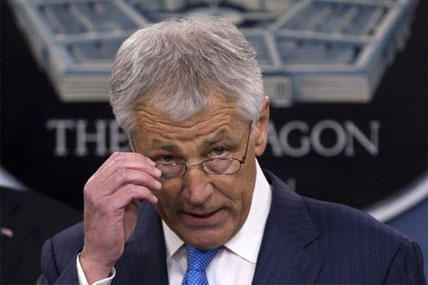The Pentagon announced a plan Thursday to curb sexual assaults in the ranks through improved protections and support for victims, tighter controls on recruiters, and more consistent reporting and prosecution of crimes across the services.
In a separate memo to all commands, Defense Secretary Chuck Hagel sought to limit the fallout from President Obama’s demands for convictions in military sexual assault cases, which have been cited by several defendants as “unlawful command influence.”
One of the key elements of the Pentagon plan would mandate that a Judge Advocate General (military lawyer) be the investigating officer for all Article 32 hearings -- sometimes likened to a civilian grand jury proceeding -- in all cases involving sexual assault. Currently, the investigating officer in Article 32 hearings can be a civilian.
The plan will also set up a victim advocacy program in each service to provide legal advice and representation for those charging they were sexually abused and standardize prohibitions on inappropriate behavior between recruiters and recruits in all the services.
Another element of the plan would give commanders the authority to transfer those accused of committing sexual assault to another unit. Right now, victims can seek to serve in another unit, but the accused does not have to be transferred.
In a statement, Defense Secretary Chuck Hagel said the goal of the plan was to “provide a safe environment in which every servicemember and DoD civilian is free from the threat of sexual harassment and assault.”
“Sexual assault is a stain on the honor of our men and women who honorably serve our country, as well as a threat to the discipline and the cohesion of our force,” Hagel said. “It must be stamped out.”
Sen. Kirsten Gillibrand, D-N.Y., and other lawmakers who have recommended taking sexual assault cases out of the chain of command applauded the Pentagon’s efforts but said they didn’t go far enough.
“As we have heard over and over again from the victims, and the top military leadership themselves, there is a lack of trust in the system that has a chilling effect on reporting” sexual assaults, Gillibrand said.
“It is time for Congress to seize the opportunity, listen to the victims and create an independent, objective and non-biased military justice system” in which independent military prosecutors -- and not commanders -- would refer cases to courts-martial, Gillibrand said.
Gillibrand’s proposal was voted down by the Senate Armed Services Committee, but she has been seeking 51 co-sponsors that would allow her to bring the legislation to the floor for a vote.
In testimony to the Senate in June, Hagel said he was open to procedural changes in the way sexual assault cases were handled, but he was against taking such cases out of the chain of command.
“I don’t personally believe that you can eliminate the command structure in the military from this process because it is the culture, it is the institution,” Hagel said. “It’s the people within that institution that have to fix the problem."
On the House side, Rep. Howard “Buck” McKeon, R-Calif., also praised the Pentagon’s sexual assault plan.
“Expanding support for victims, promoting chain of command oversight, systematic review of sexual assault investigations and increased use of lawyer investigators are vital steps necessary for the kind of cultural change that will ultimately stamp out this crisis within the ranks,” McKeon said.
At a Pentagon briefing on the plan, Jessica Wright, the acting undersecretary of defense on personnel and readiness, said “the bottom line is that sexual assault is not tolerated, not condoned, not ignored.”
In his memo to all commanders on sexual assault cases earlier this month, Hagel said, “There are no expected or required dispositions, outcomes or sentences in any military justice case, other than what result from the individual facts and merits of a case and the application to the case of the fundamentals of due process of law.”
Hagel’s memo came after several defendants in sexual assault cases argued through their lawyers that President Obama, as commander-in-chief, had exercised undue command influence in the charges brought against them.
In May, when Pentagon reports showed that as many as 26,000 servicemembers may have been the victims of “unwanted sexual contact” last year, up from an estimated 19,000 incidents in 2011, Obama said at the White House that sexual offenders in the military ought to be “prosecuted, stripped of their positions, court-martialed, fired, dishonorably discharged.”
One of the defendants arguing undue command influence is Army Brig. Gen. Jeffrey Sinclair, who is now on trial at Fort Bragg, N.C., on charges of sexually assaulting an Army captain with whom he had an adulterous affair.
At the Pentagon briefing, Army Lt. Gen. Curtis Scaparrotti, director of the Pentagon’s Joint Staff, said Hagel’s memo on command influence was intended “simply to make sure that commanders understood they act independently on the merits of the case. I think commanders have and will act independently.”
In October, Scaparrotti will take over from Gen. James Thurman as commander of U.S. Forces Korea.




























